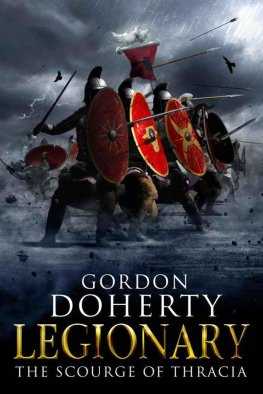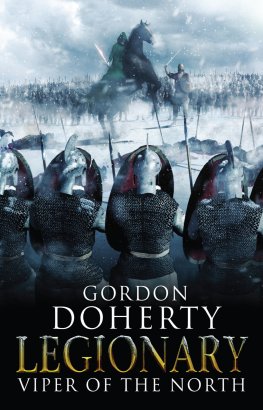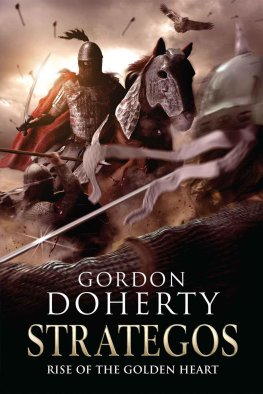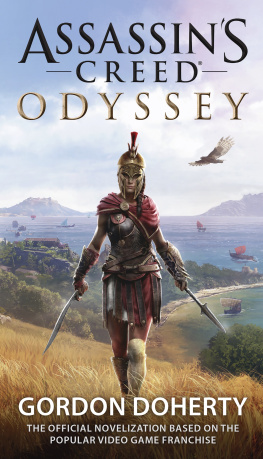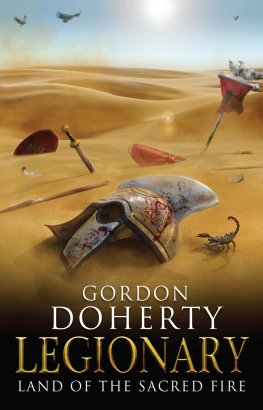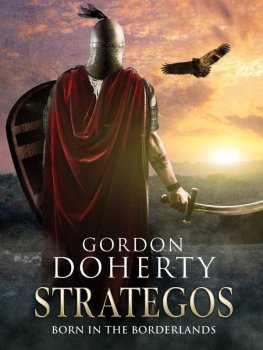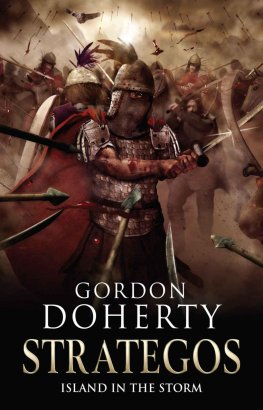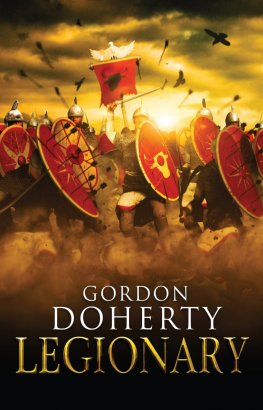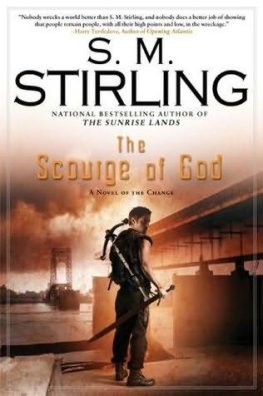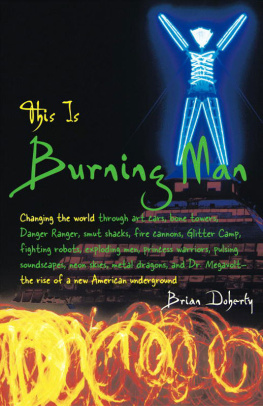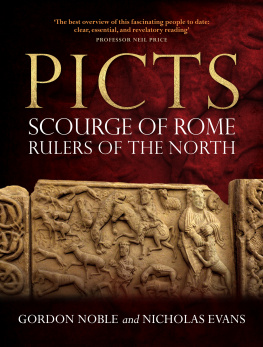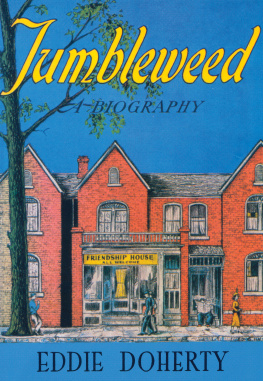Gordon Doherty - The Scourge of Thracia
Here you can read online Gordon Doherty - The Scourge of Thracia full text of the book (entire story) in english for free. Download pdf and epub, get meaning, cover and reviews about this ebook. year: 2015, publisher: www.gordondoherty.co.uk, genre: Adventure. Description of the work, (preface) as well as reviews are available. Best literature library LitArk.com created for fans of good reading and offers a wide selection of genres:
Romance novel
Science fiction
Adventure
Detective
Science
History
Home and family
Prose
Art
Politics
Computer
Non-fiction
Religion
Business
Children
Humor
Choose a favorite category and find really read worthwhile books. Enjoy immersion in the world of imagination, feel the emotions of the characters or learn something new for yourself, make an fascinating discovery.
- Book:The Scourge of Thracia
- Author:
- Publisher:www.gordondoherty.co.uk
- Genre:
- Year:2015
- Rating:4 / 5
- Favourites:Add to favourites
- Your mark:
- 80
- 1
- 2
- 3
- 4
- 5
The Scourge of Thracia: summary, description and annotation
We offer to read an annotation, description, summary or preface (depends on what the author of the book "The Scourge of Thracia" wrote himself). If you haven't found the necessary information about the book — write in the comments, we will try to find it.
The Scourge of Thracia — read online for free the complete book (whole text) full work
Below is the text of the book, divided by pages. System saving the place of the last page read, allows you to conveniently read the book "The Scourge of Thracia" online for free, without having to search again every time where you left off. Put a bookmark, and you can go to the page where you finished reading at any time.
Font size:
Interval:
Bookmark:
Gordon Doherty
The Scourge of Thracia
Prologue: The Shipka Pass
August 377AD
An eagle circled the azure sky, eyes scouring the slopes of the Haemus Mountains for prey, hunger gnawing at its belly. As if helping the eagle in its search, the warm summer wind strengthened and skirled around the craggy grey spurs of rock, buffeting the jagged silvery peaks and combing through the hardy foliage clinging to the slopes. Yet this yielded only spoors, puffs of dust or shuddering bushes where rodents had fled from sight, alert to the danger. Then the eagle spotted a hardy mountain goat, balanced precariously on the edge of a scarp to chew on the rough pasture there. But the goat was vigilant and already it was backing away towards an overhang under which its kids sheltered. There was no easy meal to be had here, so the eagle glided on to the south, its shadow tracing along the ridge path that rose towards the heart of the mountains. Here, at the highest point of the range, nothing moved. The zephyrs keened and the eagle felt its strength waning as it sought out something, anything. .
Then, its eyes locked onto an odd shape sitting astride and blocking the ridge path: a stone redoubt, lined with a small clutch of ironclad men. The men carried something on top of a staff that entranced the eagle momentarily; an effigy, a reflection of itself, wings spread and beak open as if crying out. But it was. . silvery, glistening and inanimate, with some brightly-coloured banner dangling below it, rapping in the warm wind. Spellbound, the eagle circled here until something else caught its eye: more movement, coming along the ridge path from the north towards this blockade. Another group of men far more than on the redoubt carrying glittering blades and spears. The eagle had seen such movements before and knew what was surely coming next. A primal sense of imminent danger surged to the fore. Pure instinct took over and it beat a hasty retreat, shrieking as it went. The hunger would have to remain untended for now, but the eagle resolved to return here later in the day. . when there would surely be plenty of carrion to be had.
Sarrius started at the piercing cry, his hands clenching around his shield grip and spear. He muttered a curse at the departing eagle, then felt his embarrassment fade as he noticed that the rest of his century lining the forts northern wall had been shaken by the noise too. These mountains are impassable, he tried to assure himself. But, inevitably, his gaze returned to the north and along the ridge path, eyes darting nervously over the rim of his shield, impassable. . except for this cursed, dusty ridge.
The Shipka Pass had been his home and that of the V Macedonica legion for months. All the minor broken paths north and south of the range converged onto this one precipitous ridge that ran north to south, presenting a narrow yet feasible route by which man and wagon might traverse the range. The drop on either side was perilously steep, and here, at its highest point, the path widened to a few hundred paces and commanded a fine view over the range for miles. For that reason, the battered, depleted legions of Thracia had set up this windswept fort: a sturdy stone-walled compound eight feet high blocking and guarding the path from all that might come from the north. The sides of the cramped structure were flush with the steep drop either side of the ridge and a timber palisade lined the top of the walls, part-shielding the legionaries stationed on its battlements.
Sarrius saw no movement out there, nothing apart from rippling pools of water on the track. And beyond a half mile, he could see little, the blue-ish haze and the mountains in the north obscuring the twisting ridge path. But this lack of movement gave him no comfort. From the corner of his eye, he could see a grey-black form lying far down in the valley: the broken body of a Goth, dead for over a fortnight, white bone jutting from the putrefying flesh. Its only a matter of time until they come at us again.
He tried to calm himself, glancing up at the pleasant summer sky. Breathe, he told himself, filling his lungs.
Well smell them before we see them, a nervous voice said by his side.
Sarrius turned to see his comrade, Bato, wearing a tight grin like a mask. He chuckled dutifully by way of reply, as did a few others close by on the battlements.
His fear under control, he returned his gaze to the north and fished out a piece of salted mutton from the purse on his belt. Chewing on this would lift his spirits further, he reckoned. But his hand only got to within a few inches of his lips, when his eyes locked onto something: a shuddering bush, just where the path on the ridge melted into the haze and disappeared behind a rocky peak crowned with a cairn of silver boulders. The ice returned to his veins and his vision sharpened. There had been the briefest flash of something. Eyes? Steel? His heart thumped on his ribs and he dropped the salt mutton over the wall as he readied to give the cry of alarm. . when a pair of squirrels darted from the bush, tangled in some play-fight, before racing on into another cluster of shrubs.
He glanced to Bato, then both mens shoulders sagged with sighs of relief.
And that was my last strip of mutton, Sarrius chuckled.
Fritigern, Iudex of the Thervingi and the Gothic Alliance ducked back behind the silver cairn. He cast a sour glare at the pair of rodents that had nearly betrayed his position play-fighting in the bush by the path just below. Fritigern was taller and broader than most, though age had rendered him a little hunched and turned his once long, fiery locks and beard mostly iron-grey. Still, the handful of warriors crouched with him looked to him expectantly. These five were his keenest scouts, each lithe and fleet of foot. While he wore the garb of a warrior-king an iron helm, a fine baked leather vest and dark-blue robes and a cloak these scouts were barefoot and bare-chested, wearing only trousers and armed solely with daggers. And how they had proved their worth by getting him this close to the damned fort unseen.
No Roman alarm call had been sounded, he realised. The legionaries had seen the rodents and nothing more. So he took off his helm and edged his head beyond the top of the cairn, looking to the fortified high-point of the pass once more. The forts northern wall mocked him with its presence. Like a great dam, it was still and obstinate, denying his hordes a route south. The serried rank of legionary steel looking on from the battlement jutted like fangs. Fin-topped intercisa helms, spears, mail vests and bright shields. A century, he thought, with maybe another three or four centuries in the neat, narrow lines of tents pitched in the limited space within the cramped fort. So few of them, he thought. So few, yet enough to stem the movements of my people. And but damn have I not tried to break through?
Indeed, the front of the wall was scarred with sword cuts, studded with hundreds of Gothic arrow shafts and stained with smoke and dark-brown dried blood. The armies of his alliance had crashed against this blockade several times, yet each time they had been repelled, his men fleeing back along the ridge path to their camp, north of the mountains.
He slunk back behind the cairn and sighed. It had been this way for months now, ever since the Battle at Ad Salices. The Romans had quickly realised the legions of Thracia could not defeat the Gothic Alliance nor drive it back across the River Danubius. So the legions had withdrawn to the south, leaving the Goths in the former Roman province known as Moesia the northern tract of the Diocese of Thracia and blockading the five precious passes of the mountains with stockades like this one to keep them there. Moesia might have been a welcome acquisition, Fritigern mused, were it not bereft of forage and fodder, plundered by his armies some months ago of what bounty it had to offer. And Gutthiuda, their old northern homeland across the River Danubius, had been lost to the marauding Hun hordes, so they could never return there. Now, there was no option but to break these cursed blockades, to burst through and descend into the heartlands of Roman Thracia in the south, where fresh pasture and plenty grain waited. He felt the ire and wrath of his youth rekindled, his muscles tensing with anticipation, his hands flexing, reaching for his shield and longsword.
Font size:
Interval:
Bookmark:
Similar books «The Scourge of Thracia»
Look at similar books to The Scourge of Thracia. We have selected literature similar in name and meaning in the hope of providing readers with more options to find new, interesting, not yet read works.
Discussion, reviews of the book The Scourge of Thracia and just readers' own opinions. Leave your comments, write what you think about the work, its meaning or the main characters. Specify what exactly you liked and what you didn't like, and why you think so.

